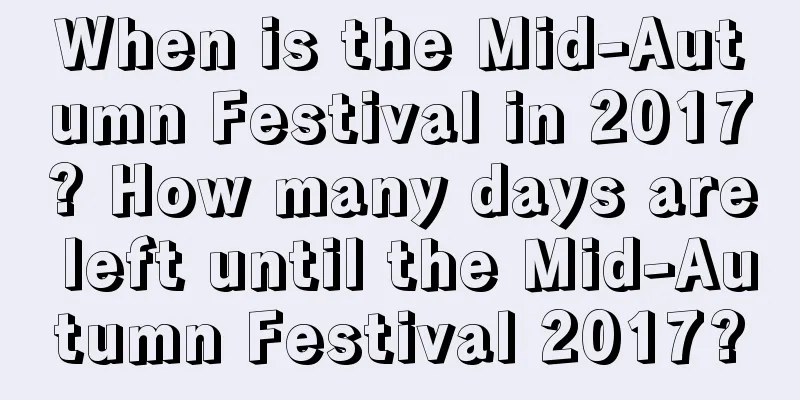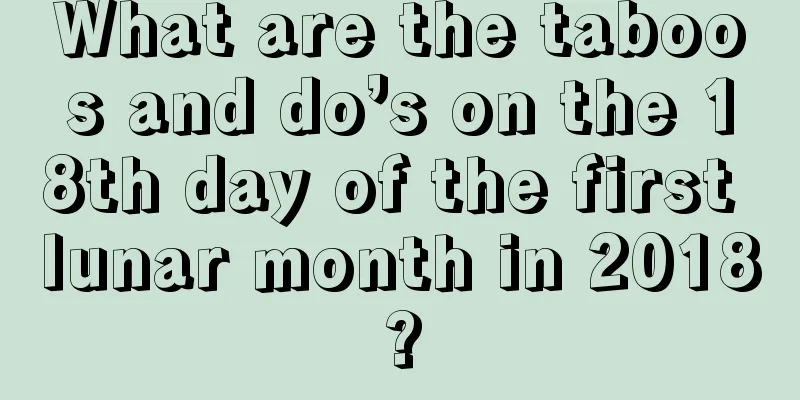What are the customs on the fifth day of the first lunar month? How do different regions celebrate the fifth day?

Introduction: Our country is vast and has rich resources. There are obvious differences in culture between the north and the south. The fifth day of the first lunar month is a "special" day. What festival is this day? What are the customs and taboos? How do people in different provinces and regions of our country celebrate the fifth day of the New Year? Now, please follow the editor to learn about it! The festive culture of the Chinese New Year is rich and colorful, and extraordinary. If you want to know more related content, just search in the Spring Festival special topic carefully compiled by Mr. Shui Mo!The fifth day of the first lunar month: drive away the five poorThe fifth day of the first lunar month is commonly known as Po Wu. On this day, a custom called driving away the "five poor" is popular in many places. People get up at dawn, set off firecrackers and clean the place. Firecrackers were set off from every house, and people walked towards the door as they set them off. It is said that all unlucky things and all demons and monsters will be blasted away, and kept as far away from us as possible. Cleaning is a thorough housecleaning. Sweep the rubbish out of every house. From the 30th day of the 12th lunar month to the 5th day of the 1st lunar month, cleaning is generally not allowed. You can sweep the floor, but only inside the house, and the garbage can only be placed in the corner of the house. Especially on the first day of the Lunar New Year, not even a broom can be moved, as it is said that if you move it, the good luck will be gone. But on the fifth day of the New Year, you have to do a thorough cleaning. When the garbage was swept out of the door and into a corner, the firecrackers were moved outside the house. Then a huge firecracker was taken, placed on the garbage pile, and lit. With a bang, the ceremony was over. People said: Now, all the poor and needy people have been driven away! Then eat.Detailed explanation of how people in different regions celebrate the fifth day of the Chinese New YearThis custom is similar in Guanzhong, Dongfu and Xifu. But after firing the cannon, the food eaten is not exactly the same.People in Long County of Xifu eat jiaotuan, saying that they want to use this sticky food to stick away all the unpleasant things. It is said that in some places in the Wei River Valley, people also eat jiaotuan during the Chinese New Year, but not on the fifth day of the New Year, but on the 30th day of the twelfth lunar month, such as Sanyuan County and Wugong County. This is the same as Long County. In Long County, people eat jiaotuan three times during the Chinese New Year, on the 30th day of the twelfth lunar month, the 5th day of the first lunar month, and the 7th day of the first lunar month. In Bin County, people also eat jiaotuan on the fifth day of the first lunar month. It is said that "eat the poor meal and get rid of the root of poverty" or "paste the poor pit" or "fill the poor pit". It is also appropriate to use foods such as stir-fried rice to make paste or fill the stomach. People in Bin County say that they can’t eat meat or drink alcohol anyway. In Chunhua County, which is located on the Weibei Plateau, people also eat jiaotuan on this day, which is said to be used to fill the gap in poverty. People are not allowed to go out to visit relatives on this day, as they say they do not want their relatives to be affected by the poverty. The most interesting place is Fengxiang County, the birthplace of the Qin people. It is also called Po Wu. People also get up early, do a thorough cleaning, and set off cannons. However, the food they eat and the etiquette of eating are very different. They eat dumplings. It’s not called dumplings, it’s called boiled dumplings. Wrap it the night before and cook it the next morning. Also stuffed with meat. The trick is that when making dumplings, you have to light a stick of incense, and then circle it over the bowl containing the dumpling stuffing, and then you can make the dumplings. why is that? People in Fengxiang say: This is to gather the "five poor" and the like together, wrap them up, cook them, and eat them. The Qin people were heroic and thorough in their work. What they did was not just to drive away the "five poor", but to kill them all, which was a bit like "eating their flesh and sleeping on their skin". Note: The "Five Poor" are also called the "Five Ghosts". It refers to five types of poor people: poor in intelligence, poor in learning, poor in literature, poor in life, and poor in friendships. It was once seen in Han Yu's "Sending Away Poverty". This great poet said, "These five ghosts are my five troubles," so they must be sent away. No matter what writers think in their hearts, their writing is always relatively peaceful. Although it is a big problem for me, I will still send it off politely. When it comes to the common people, they tell the truth, "drive out the five poor" and "fill the poverty pit", and they use firecrackers and brooms without being polite. After all, this is not a treat or a gift. Killing everyone without mercy is the most passionate and thorough of them all. "Po Wu": Tianjin people call the fifth day of the first lunar month "Po Wu". On this day, every household eats dumplings, and the chopping board must make a clanging sound so that the neighbors can hear it, to show that they are chopping "villains". Tianjin people attribute all the unpleasant things to "villains", and only by getting rid of the "villains" can they have good luck and success. Setting off firecrackers on the fifth night of the New Year also means warding off evil and avoiding disasters. Five Horse Days (Po Wu). The fifth day of the first lunar month is called "Five Horse Day" in some places in Shandong, and the weather of this day is used to predict the fortune of mules and horses in that year. It is said that if the sky is clear on this day, mules and horses will be prosperous. According to Dongfang Shuo's "Book of Divination", the first day of the first lunar month is for chickens, the second day is for dogs, the third day is for pigs, the fourth day is for sheep, the fifth day is for cows, the sixth day is for horses, the seventh day is for humans, and the eighth day is for grain. I don't know how Shandong mistakenly changed the Ox Day to the Horse Day. This day is also called "Po Wu". In some areas, women cannot go out to visit relatives before the fifth day, are not allowed to use rulers and scissors to do needlework, and are not allowed to cook raw rice, raw noodles, and raw vegetables. After this day, these taboos are no longer necessary. In Linqing area, on the fifth day of the New Year, the family holds a ceremony to send off the family hall. Before daybreak, people had already cooked dumplings, offered sacrifices, burned paper, and kowtowed. They then put away the ancestral tablets and waited for three cannon shots. All the men in the clan gathered together with incense, paper, and firecrackers, and lined up to visit the graves, to send their ancestors home. Along the way, some people carried offerings, some set off firecrackers, and when they arrived at the cemetery, they burned incense and paper and kowtowed, shouting, "Grandpa and grandma, we're home!" Yinan also cleared the family hall on this day. Some people also ate fried cakes and swept the yard. It is said that sweeping the yard on this day will not attract ants. Kenli, Shouguang and other places set off firecrackers on this day and families have dinner together to mark the passing of the New Year. In the southwestern part of Shandong Province, people wrap scissors with string and place them under the bed on New Year's Eve to hold them down. They can only be used on the fifth day of the New Year. Women in Linyi and Zoucheng stay at home, comb their hair, or touch needles and thread on this day, as it is said that touching needles and thread will attract scorpions and centipedes. People usually eat dumplings at noon on this day, but they can also eat noodles. There is a saying that "If you eat noodles on the fifth day, you will get one dan of harvest per acre." Summary: The above article content is the editor’s compilation of the analysis of the customs of the fifth day of the first lunar month and the differences in customs and culture in different regions. You can learn about it and feel the cultural differences between different ethnic groups in my country. After reading this article, there are more exciting content in the Spring Festival special topic, let’s take a look! |
<<: What festival is on the eighth day of the first lunar month and what are its customs?
Recommend
Is it good for a tiger baby born in August of the lunar calendar in 2022? What is his fate?
The eighth month of the lunar calendar is also kno...
Is it auspicious to move house on August 21, 2020, the day before Cold Dew - October 7?
Introduction: It is also necessary to choose an au...
Is it a good idea to pray on the fifth day of the third lunar month in 2020? Is the hexagram for the day good?
The timing of praying is also very important. So, ...
Is the fifth day of the fifth lunar month in 2018 a suitable date for decorating a house?
Introduction: Decoration is a major event for peop...
Lunar August 7, 2020: Good and bad luck at different times, and auspicious and taboo times
The eighth month of the lunar calendar is also kn...
When is the Grain Rain solar term in 2019 and what is the exact time of Grain Rain?
As mid-April approaches, the last solar term of sp...
What is the fate of those born at the hour of Yin on the Great Snow Day in 2019? What is the lucky star?
What is the fate of those born at the hour of Yin ...
What day is the sixth day of the fourth lunar month in 2018? What month and date is it?
The fourth month of the lunar calendar marks the ...
Is it suitable to get a haircut on October 13th of the lunar calendar in 2020? Is it an auspicious day?
Is it suitable to get a haircut on October 13th of...
What is the direction of the God of Happiness during the Lantern Festival in 2021? What is the hexagram for this day?
The Lantern Festival is one of China's major t...
What is the zodiac sign of a child born on the second day of the first lunar month in 2019? Is his personality good?
Introduction: Children born on different days belo...
How many days are there in the twelfth lunar month? Is it 30 days?
The number of days in each month is not fixed, so ...
Is the seventh day of the eleventh lunar month in 2017 an auspicious day?
According to Chinese tradition from ancient times ...
What are the do's and don'ts on the 27th day of the third lunar month in 2019?
March is the beautiful month of spring. We all kn...
Is it a good idea to offer sacrifices on the eighth day of the fourth lunar month in 2018?
Sacrifice is an important cultural custom in our c...









